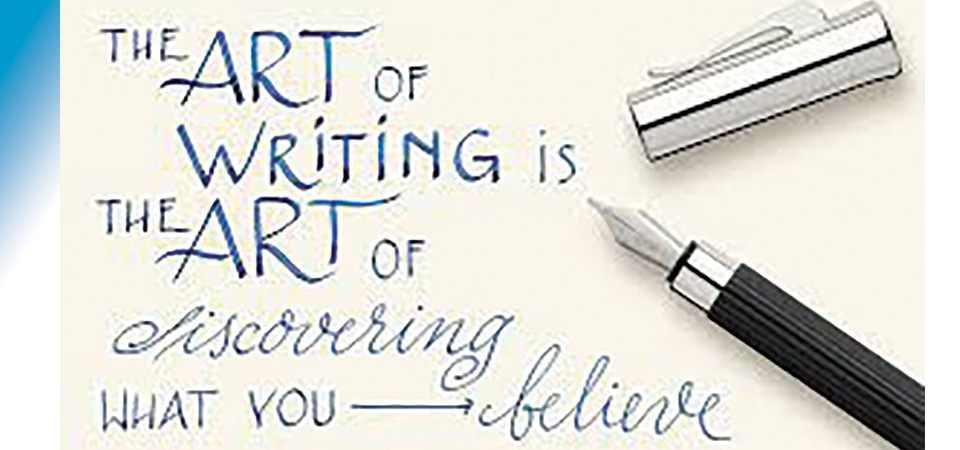Art Of Writing

Dixya Poudel
As a writer, I am always enthralled by great works of literature. Literature can enrich lives as they impart sagacious wisdom from the ancient world to current times. As a part of collective humanity, literature evokes the most profound humane elements.
By and large, the world has been shaped by written words. People are moulded and empowered by the utility of words throughout their lives. It is said that words carry more weight than ammunitions. It is thus necessary to understand, interpret and comprehend influential literature. Certainly, writing has an interesting history in the human world. According to scholars, the earliest writings appeared in the form of pictorial signs about 5,500 years ago in Mesopotamian civilization. They later evolved as representations of Sumerian sounds since Sumerian was the language of Mesopotamia. Egypt in 3200 BC too incorporated some forms of writing. By 1300 BC writing had become fully-fledged in Shang-dynasty China. Since then people have been writing either through quills dipped in ink, pen in paper or through typewriters. And in modern days, quills, pens and typewriters have been replaced by computers which mainly use MS Word for expediency.
Writing is a unique vocation in which writers often bare their soul through both fiction and non-fiction works. In fiction, it is through plots, characters and dialogues. In non-fiction, it is through the amplification of a thesis. The process of writing is solitary but once published, the work becomes the domain of the readers. And who are writers without readers? As I write, I reach out for words because they are the foundation of any works of writing. However, writing with the readers in mind can be difficult. What if no one reads my work? Will I succeed in conveying my thoughts? I nevertheless put faith in the words that I write as I try my best to convey my feelings and emotions with empathy. As J.M. Coetzee has said, "All autobiography is storytelling; all writing is autobiography."
As such, writers are a strange specimen with an innate ability to conjure up words out of thin air. They feel the responsibility to breathe life to listless words and turn them into armour. Words are indeed a basis of literature and they can reach beyond the pages to the depths of human souls. They further have the ability to create history. Very often writers are revered for their contribution to the literature that sheds to light the very essence of humanity. The world has seen brilliant authors such as Henry James, John Steinbeck, F. S. Fitzgerald, Louisa May Alcott, Virginia Woolf, Sylvia Plath, Ernest Hemmingway, Agatha Christie and Jane Austen among others. In the contemporary world, there are authors such as J. K. Rowling, Stephen King, Donna Tartt, Kate Morton, Haruki Murakami etc. Each of these authors has carved a name in English literature. Seasoned readers can easily discern between different writing styles. And writers have their methods and styles of writing. Often there are tormented souls that seek solace through writing. Thus, English literature has seen writers spiral in a vortex of despair that nonetheless reflect brilliantly through their works.
I learned to write mostly on my own. As I read widely, I discovered that I too wanted to pen my thoughts to paper. I mostly aspired to emulate authors whom I admired. There were moments in reading when I would be swept up in different worlds. Reading certainly transports the readers to different times and places. Deep into my reading, I might be in ancient civilizations or contemporary societies. I might be in magical places or alternate realities. Nothing is more alluring than a novel that succeeds in creating imaginary worlds. On the other hand, reading about real-life people and events is vastly educational. Reading and writing are considered complementary as they fuel off each other almost symbiotically.
Writers further tend to be creative and artistic. They not only entertain the readers but also educate and inform them. People often confess that they write in their journals to alleviate their pain and suffering. It goes to show that writing can be cathartic. It purges the soul from maladies and sorrows of struggles and heartaches. Poets will tell you that scribbling thoughts on paper makes them somehow freer. Further, freedom of speech and expression is an important aspect of the democratic world that is a blessing to authors, poets, screenwriters, novelists, journalists and storytellers alike. The identities of writers are thus intrinsically bound with their expression.
And self-expression isn’t just a platform for self-promotion; it is also a vital element for a creative minded person. Indeed writing is a form of expression, a way to convey not just thoughts but also emotions which can be inspiring and liberating. As the renowned writer Henry Miller has said, "Writing is its reward."
(Poudel is a freelance writer)
Recent News

Do not make expressions casting dout on election: EC
14 Apr, 2022
CM Bhatta says may New Year 2079 BS inspire positive thinking
14 Apr, 2022
Three new cases, 44 recoveries in 24 hours
14 Apr, 2022
689 climbers of 84 teams so far acquire permits for climbing various peaks this spring season
14 Apr, 2022
How the rising cost of living crisis is impacting Nepal
14 Apr, 2022
US military confirms an interstellar meteor collided with Earth
14 Apr, 2022
Valneva Covid vaccine approved for use in UK
14 Apr, 2022
Chair Prachanda highlights need of unity among Maoist, Communist forces
14 Apr, 2022
Ranbir Kapoor and Alia Bhatt: Bollywood toasts star couple on wedding
14 Apr, 2022
President Bhandari confers decorations (Photo Feature)
14 Apr, 2022










